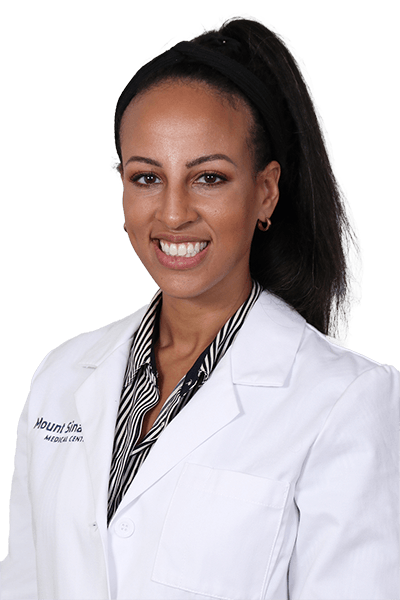Gynecology
Well Women’s Care
Here at Mount Sinai, we understand that women’s health looks unique for every individual, which is why our experts provide personalized care tailored to our patients’ needs at every stage of their life. With routine checkups, general exams, and screenings to address medical issues faced by women, we ensure our patients receive the highest level of gynecologic care. Annual wellness checkups for women should become routine around age 18, and here is what you can expect during a well-woman exam:
- General health assessment to point out any abnormalities or particular issues that may require medical attention
- Pelvic exams, which may include both an external and internal examination of your reproductive organs
- Breast exams to check for any abnormalities, lumps, or pain
- Pap smears to test for precancerous or cancerous cervical cells, starting at age 21
- If you are sexually active or considering becoming sexually active, you and your gynecologist will have a discussion to consider your options for birth control or general sexual health and safety
Uterine Fibroids
Uterine fibroids, or leiomyomas, refer to benign growths in the uterus made up of uterine muscle and connective tissue. This condition often occurs in women during their childbearing years and rarely produces symptoms. Uterine fibroids do not increase an individual’s risk for cancer and often go undetected; however, if symptoms do occur, they may show up as a heavier menstrual flow, increased period length, slight pelvic pain, frequent urination, constipation, or lower back pain. Uterine fibroids are common and may form as a single nodule, a cluster, or in various locations within the uterus. Mount Sinai’s medical experts can detect uterine fibroids through the following procedures:
- Pelvic exams
- Ultrasounds
- Lab tests
- MRI scans
- CT scans
Treatment
In most cases, uterine fibroids do not require any treatment. However, if issues do appear, such as severe pain, excessive bleeding, or infertility issues, our specialists at Mount Sinai may recommend treatment, including the following:
- Medications — Mount Sinai’s medical experts will provide patients with medication to alleviate the symptoms associated with this condition. In addition to pain medication, our physicians often prescribe hormone therapy for those patients whose symptoms become more severe — these hormone treatments include the use of birth control, estrogen, and progestin.
- Uterine Artery Embolization
- Surgery — If necessary, Mount Sinai’s surgeons can perform a variety of procedures depending on the size of the fibroids that include the following:
- Myomectomy — This procedure can remove the fibroids while leaving the uterus still viable for pregnancy.
- Hysterectomy — This procedure removes the uterus and serves as the most effective measure for complete fibroid removal, but it will prevent any future pregnancies.
Endometriosis
Endometriosis occurs when tissue similar to the uterine wall grows elsewhere in the body, such as in the ovaries or the fallopian tubes. This tissue acts the same as uterine tissue and follows the menstrual cycle, often causing pain similar to menstrual cramps. Because this tissue bleeds and sheds during a woman’s cycle yet cannot exit the body, endometriosis can cause cysts to form around the ovaries (endometrioma) and irritate affected areas. Endometriosis usually affects less than 10 percent of women and may lead to infertility issues. The most common symptoms are excessive bleeding, increased menstrual cramps and occasionally, pain during intercourse.
Treatment
- Medication — Mount Sinai’s medical experts will provide patients with medication to alleviate their symptoms and help minimize the pain associated with this condition. In addition to pain medication, our physicians often prescribe hormone therapy if symptoms become more severe. These hormone treatments include the use of birth control, estrogen, or progestin.
- Laparoscopy — This minor surgery allows our doctors to remove endometrioma and other endometrial growths without damaging the uterus.
- Laparotomy — If more extensive surgery is necessary, this procedure removes more endometrial tissue, while risking more of the healthy tissue. Overall, the patient still has the capacity for pregnancy.
- Hysterectomy — This procedure removes the uterus and is the most effective measure for treating endometriosis but will prevent future pregnancies.
STDs/STIs
Sexually transmitted diseases or infections refer to bacterial, viral, or parasitic diseases that transfer from person to person through sexual contact through blood, semen, vaginal, or other bodily fluids. Although these infections can lead to serious health issues if not treated, our experts at Mount Sinai help women get tested and treated for STDs before serious health complications arise. Many STDs go undetected in women. However, some symptoms to look for include sores or bumps on the genital or oral areas, pain or bleeding after sexual intercourse, painful or frequent urination, abnormal discharge, lower abdominal pain, and itching or irritation around the vagina.
Treatment
Treatment for STDs will look different depending on the specific infection but in general, Mount Sinai’s physicians offer the following treatment options:
- Antibiotics are the most common way to treat sexually transmitted diseases, as bacterial infections cause most STDs. Our doctors will prescribe antibiotics for STDs like gonorrhea, syphilis, chlamydia, and others.
- Antiviral drugs may be used to treat viral STDs; however, these infections usually affect parts of the body unrelated to the female reproductive system.
Menstrual Disorders
Mount Sinai’s experts provide personalized care tailored to each patient, so treatment options for various menstrual disorders differ depending on the individual case. Overall, the treatment options will include the following:
- Pain medication to alleviate excessive cramps or menstrual pain
- Hormone medication, such as the birth control pill, estrogen, or progestin, to help regulate the cycle, control the flow of blood, or stimulate menstruation
- Surgeries that include endometrial ablations, myomectomies, or sometimes hysterectomies
- Uterine artery embolization: the patient is referred by their OBGYN to our Interventional Radiology team for a minimally invasive procedure, where a real-time x-ray (called fluoroscopy) is used to block the arteries that cause growth of fibroids.
Polycystic Ovary Syndrome (PCOS)
Polycystic ovary syndrome, or PCOS, is a common hormonal disorder that affects women of childbearing age. It occurs when women produce more androgen (a male sex hormone) than average, creating cysts around the ovaries. High androgen levels can stem from different causes, including insulin resistance and abnormal ovulation. Some common symptoms include excess body hair, weight gain, acne, hair thinning, irregular or light periods, and large, cystic ovaries. PCOS may increase the risk of certain uterine cancers, type 2 diabetes, obesity, heart problems, and infertility.
Treatment
Mount Sinai’s experts provide personalized care tailored to each patient, so treatment options for PCOS differ depending on the individual case. Overall, the treatment options will include the following:
- The recommendation of dietary or lifestyle changes to help the body use insulin more effectively and lose weight. A healthier diet can help alleviate some symptoms of PCOS.
- Birth control, estrogen, and progestin therapies can stimulate ovulation, reduce androgen levels, regulate the menstrual cycle, limit acne, and protect against endometrial cancer.
- The prescription of diabetes medication to lower insulin resistance and reduce androgen levels.
Polycystic Ovary Syndrome (PCOS)
Polycystic ovary syndrome, or PCOS, is a common hormonal disorder that affects women of childbearing age. It occurs when women produce more androgen (a male sex hormone) than average, creating cysts around the ovaries. High androgen levels can stem from different causes, including insulin resistance and abnormal ovulation. Some common symptoms include excess body hair, weight gain, acne, hair thinning, irregular or light periods, and large, cystic ovaries. PCOS may increase the risk of certain uterine cancers, type 2 diabetes, obesity, heart problems, and infertility.
Treatment
Mount Sinai’s experts provide personalized care tailored to each patient, so treatment options for PCOS differ depending on the individual case. Overall, the treatment options will include the following:
- The recommendation of dietary or lifestyle changes to help the body use insulin more effectively and lose weight. A healthier diet can help alleviate some symptoms of PCOS.
- Birth control, estrogen, and progestin therapies can stimulate ovulation, reduce androgen levels, regulate the menstrual cycle, limit acne, and protect against endometrial cancer.
- The prescription of diabetes medication to lower insulin resistance and reduce androgen levels.
Abnormal Uterine Bleeding (AUB)
Abnormal uterine bleeding (AUB) refers to a wide range of irregular menstruation conditions. Primarily, AUB indicates heavy menstrual periods, bleeding in between periods, and prolonged menstrual periods or cycles. The causes of these symptoms vary and can range in severity from a hormone imbalance to cancer. Because a woman may experience abnormal bleeding for various reasons, Mount Sinai’s gynecologic specialists will perform tests based on each patient’s symptoms to ensure their diagnosis is as accurate as possible.
Treatment
Mount Sinai’s experts provide personalized care tailored to each patient, so treatment options for various menstrual disorders differ depending on the individual case. Overall, the treatment options will include the following:
- Pain medication or anti-inflammatory drugs
- Hormone medication, such as the birth control pill, estrogen, or progestin, to help regulate the cycle, control the flow of blood, or manage heavy bleeding
- Surgeries, including endometrial ablations, myomectomies, or even hysterectomies
Minimally Invasive Procedures
Mount Sinai Medical Center’s gynecologists are trained in the most advanced minimally invasive procedures, and can often provide surgical care with the convenience of an office visit or outpatient setting. Many of our minimally invasive approaches include procedures that do not require any incisions or cuts on the outside of the body. Instead, your Mount Sinai gynecologist may access the area of treatment directly through the vagina.
At Mount Sinai, our gynecologists utilize minimally invasive approaches (as opposed to open surgery) whenever possible for a variety of benign (noncancerous) procedures, including the following:
- Removal of fibroids
- Tubal ligations, which involves severing or blocking the fallopian tubes to prevent future pregnancies
- Hysterectomy to remove the uterus (and sometimes, the cervix, ovaries, and fallopian tubes)
- Oophorectomy, which is a more limited surgery than a hysterectomy and only removes the ovaries
- Dilation and curettage, which removes the lining of the uterus and is often required after a miscarriage
- Reproductive/fertility surgery to increase the likelihood of becoming pregnant
Our Physicians
- Mount Sinai Medical Center (Main Campus)
- 305.674.2655
- Mount Sinai Primary & Specialty Care Sunny Isles Beach
- 786.274.8105
- Mount Sinai Emergency Center, Physician Offices, Cancer Center and Diagnostic Center Aventura
- 305.692.1080
Asante Badu, MD
- Obstetrics and gynecology
- Mount Sinai Medical Center (Main Campus)
- 305.674.2655
- Mount Sinai Primary & Specialty Care Sunny Isles Beach
- 305.760.9895
Larry Goldenberg, MD, MBA, FACOG
- Obstetrics and gynecology
- Mount Sinai Medical Center (Main Campus)
- 305.674.2655
- Mount Sinai Primary & Specialty Care Sunny Isles Beach
- 786.274.8105
Jeff T Moise, MD
- Obstetrics and gynecology
- Mount Sinai Medical Center (Main Campus)
- 305.674.2121
- Mount Sinai Emergency Center, Physician Offices, Cancer Center and Diagnostic Center Aventura
- 305.692.1010
- Mount Sinai Primary & Specialty Care Sunny Isles Beach
- 786.274.8105
Lorena K. Rosero, MD
- Obstetrics and gynecology
- Mount Sinai Medical Center (Main Campus)
- 305.674.2655
- Mount Sinai Primary & Specialty Care Sunny Isles Beach
- 786.274.8105
Mauricio Y Bitran, MD
- Obstetrics and gynecology
- Mount Sinai Medical Center (Main Campus)
- 305.674.2121







